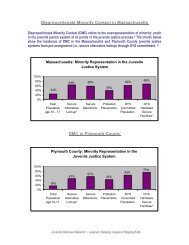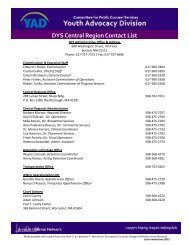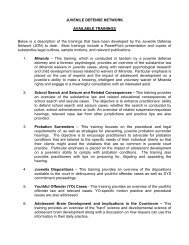Adolescent Brain Development - the Youth Advocacy Division
Adolescent Brain Development - the Youth Advocacy Division
Adolescent Brain Development - the Youth Advocacy Division
You also want an ePaper? Increase the reach of your titles
YUMPU automatically turns print PDFs into web optimized ePapers that Google loves.
<strong>Adolescent</strong> <strong>Brain</strong> <strong>Development</strong><br />
Quick Reference Experts List (DRAFT)<br />
BAIRD, ABIGAIL, Ph.D.<br />
Neuroscientist – Dartmouth College<br />
Phone: (603) 646-9022 Fax: Email: abigail.a.baird@dartmouth.edu<br />
Website: http://www.dartmouth.edu/~psych/people/faculty/a-baird.html<br />
Worked with Deborah Yurgelun-Todd (below) on <strong>the</strong> 1999 study involving teens’ identification of<br />
emotions. In subsequent experiments, Dr. Baird learned that teens’ correct recognition of emotional<br />
responses significantly improved when <strong>the</strong> faces were those of people <strong>the</strong>y knew, suggesting that<br />
adolescents are more prone to pay attention to things that are more closely related to <strong>the</strong>m.<br />
BJORK, JAMES, Ph.D.<br />
Researcher – National Institute on Alcohol Abuse and Alcoholism.<br />
Phone:<br />
Website:<br />
Fax: Email:<br />
Researcher at <strong>the</strong> National Institute on Alcohol Abuse and Alcoholism who used MRI technology to scan<br />
brains of 12 adolescents (aged 12-17) and 12 adults (aged 22-28) comparing <strong>the</strong>ir responses to simulated<br />
situations involving risks and rewards. The study found that youth tend to use lower activation of <strong>the</strong> part<br />
of <strong>the</strong> brain associated with motivating behavior toward <strong>the</strong> prospect of rewards. Dr. Bjork notes that <strong>the</strong><br />
study “may help to explain why so many young people have difficulty achieving long-term goals.”<br />
FASSLER, DAVID, M.D.<br />
Clinical Associate Professor – UVM Medical School, Psychiatry Dept.<br />
Phone: (802) 865-3450<br />
Website:<br />
Fax: Email: David.Fassler@uvm.edu<br />
<strong>Adolescent</strong> psychiatrist who testified on behalf of <strong>the</strong> American Psychiatric Association in Nevada in<br />
2003 and New Hampshire in 2004 to try and persuade <strong>the</strong> state legislatures to abolish <strong>the</strong> death penalty<br />
for juveniles. Both states abolished <strong>the</strong> practice after Dr. Fassler’s testimony, which used studies<br />
regarding <strong>the</strong> development of <strong>the</strong> adolescent brain as part of <strong>the</strong> basis of his argument.<br />
GIEDD, JAY, M.D.<br />
Neuroscientist – National Institute of Mental Health (NIMH)<br />
Phone: (301) 435-4517<br />
Website:<br />
Fax: Email: GieddJ@intra.nimh.nih.gov<br />
Has performed extensive research involving almost 2,000 kids and adolescents using MRI technology<br />
that demonstrates that adolescent brains are still developing and are different from fully-developed adult<br />
brains. Dr. Giedd has created records of each of <strong>the</strong> youth he has scanned, taking MRI every two years,<br />
showing <strong>the</strong> growth and development of <strong>the</strong> brain over <strong>the</strong> years. His research shows that especially in<br />
early adolescence, <strong>the</strong> brain is undergoing drastic changes.

















